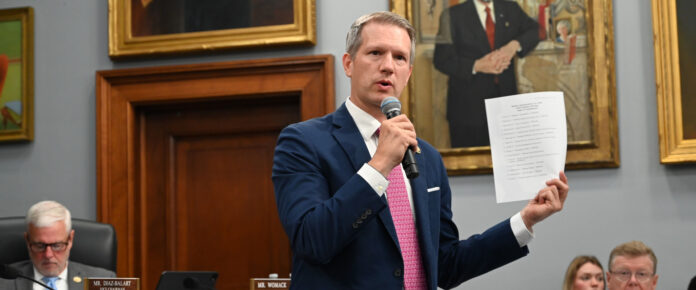A United States lawmaker, Rep. Riley M. Moore, has called on the Nigerian government to disarm what he described as “radical Muslim Fulani militants” following the abduction of more than 300 children and 12 teachers from St. Mary’s Catholic School in Niger State. The attack, which took place on Friday morning, has once again brought global attention to Nigeria’s ongoing security crisis.
Moore, who represents Virginia’s Second District in the U.S. Congress, reacted to the incident in a post on his official X (formerly Twitter) account on Saturday. He expressed deep concern over the mass kidnapping and said the continued attacks on schools in Nigeria should not be ignored by the international community.
“We now know that more than 300 children and 12 teachers have been kidnapped from St Mary’s Catholic School in Nigeria,” Moore wrote. “As a father, seeing these attacks makes my stomach turn. The Nigerian government must disarm the radical Muslim Fulani militants terrorizing the Middle Belt.”
The abduction occurred in the early hours of Friday when armed attackers stormed St. Mary’s Catholic School in Agwara Local Government Area of Niger State. According to eyewitness accounts, the gunmen arrived on motorcycles and fired shots into the air to scare students and teachers before forcing hundreds of them into the bush.
Local officials said the attack lasted several minutes and that security operatives were overwhelmed. Community sources confirmed that the attackers moved swiftly, leaving little time for the school authorities or residents to respond.
This latest incident is one of the largest mass kidnappings in recent years, recalling previous cases such as the 2014 Chibok schoolgirls’ abduction, the 2018 Dapchi girls’ kidnapping, and the 2021 Kagara and Tegina school invasions—all of which happened in northern Nigeria.
Rep. Moore’s comments come at a time when the United States Congress has shown growing interest in Nigeria’s security situation, particularly regarding religious violence and attacks on Christian communities. Some U.S. lawmakers and advocacy groups have recently accused Nigeria of failing to protect religious minorities, especially in the Middle Belt where clashes between armed herders and farming communities have intensified over the past decade.
Moore’s claim that “Fulani militants” are behind the attacks reflects a widely debated narrative in international circles. While some analysts argue that violent herders—many of whom are ethnic Fulani—are responsible for deadly raids on rural communities, others caution against generalizing entire ethnic or religious groups, noting that criminal gangs and terror cells often operate under different motives.
In Nigeria, the term “Fulani militants” remains controversial. Security experts say the violence is driven by a mix of factors including land disputes, banditry, poverty, and weak law enforcement. Many also warn that labeling the violence purely along religious or ethnic lines can worsen tensions.
School kidnappings have become a recurring nightmare in parts of northern Nigeria. Armed groups have increasingly targeted schools, viewing them as soft targets for mass abductions that can lead to ransom payments. These attacks have forced many schools in rural areas to shut down, disrupting education and leaving thousands of children vulnerable.
Niger State, in particular, has suffered several attacks by bandits and terror groups who operate in forested areas along the borders with Kebbi and Zamfara states. Efforts by the government and security forces to secure the region have yielded mixed results.
The latest attack on St. Mary’s Catholic School has renewed concerns about the ability of security agencies to protect vulnerable communities, especially at a time when the Federal Government has denied rumours of nationwide school closures.
Rep. Moore’s statement adds to the increasing pressure on Nigeria from foreign governments, human rights groups, and international organisations. Many are calling for stronger action against armed groups operating across the northern region.
While Nigeria has repeatedly rejected allegations of religious persecution, it acknowledges that banditry, terrorism, and farmer-herder conflicts have created significant instability. The Federal Government insists that these conflicts are not driven by religion alone but by a complex set of socio-economic and security issues.
Moore’s remarks also highlight the sensitivity surrounding international perceptions of Nigeria’s security crisis. In recent years, Nigerian officials have worked to counter claims of “Christian genocide” made by some American activists and lawmakers. The government argues that both Christians and Muslims have suffered heavy casualties from armed groups.
As of Saturday evening, the Nigerian government had not issued an official response to Rep. Moore’s comments. However, security agencies say they have launched a search-and-rescue operation to free the abducted children and teachers. The Niger State Police Command and the Nigerian military have intensified patrols in the area, though details of the operation remain limited.

